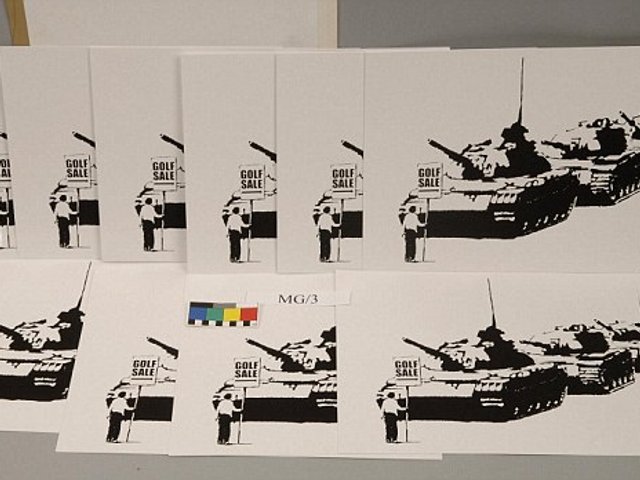Last month, we revealed that employees of Pictures on Walls (POW), the company which publishes and authenticates works on paper by the anonymous graffiti artist Banksy had sold unauthorised works by the artist on eBay. These had been stamped with a replica of the POW blindstamp and some of them carried forged signatures.
According to the account of a whistleblower who participated in the online fraud, prints from the Grin Reaper, Grannies, and Soup Can series were circulated in addition to the authorised print run. These were placed on eBay by a network of collaborators working with POW employees.
Fake bids were then placed on the unauthorised prints by the people selling them, a process known as shill bidding, in which prices are artificially inflated. This is illegal in the UK under the 2006 Fraud Act.
According to our source, the fraud has taken place for around a year as prices for Banksy’s works have soared. The unauthorised prints on eBay were not accompanied by the POW paperwork which is issued with authorised prints. Buyers of the unauthorised prints were told to call POW and speak to specific employees—those collaborating in the fraud. An email, seen by The Art Newspaper, from a POW employee to an outside agent who had been asked to sell an unauthorised print on eBay explained that POW was attempting to obtain a “new old emboss” for the print in question.
When we first presented these allegations to POW, Banksy, and his dealer Steve Lazarides, they issued a statement through Mark Stephens of Finers Stephens Innocent in which they acknowledged that “25 bad prints have been sold on eBay” and said that an immediate investigation had been launched. They stressed that they “along with members of the public have been victims of criminal behaviour”. When we presented our evidence to eBay, the company shut down four seller accounts.
Just two weeks later, POW published another statement on its website. In contrast to their earlier comments, this said that the company was “unable to find any evidence of a serial fraud being conducted by current or former members of staff. We are aware that former staff have sold a number of prints via eBay but we have found nothing to indicate these prints were issued fraudulently. Our investigation has led us to believe that there are questions over the provenance of a small number of prints.” The statement then listed 11 works in the Happy Chopper and Weston-Super- Mare series. POW was unwilling to provide further information about these prints.
When challenged on the apparent speed with which the POW investigation had taken place and the discrepancies between the two statements, POW released a third statement through Mark Stephens which said that the investigation had in fact not been concluded but was “ongoing” and that POW had instituted a “ban on any member of staff selling any type of artwork over the internet as a condition of their employment”.
“We can confirm that our investigations revealed some prints given to staff as gratuities by some artists have been sold on eBay, however, we reiterate that we have no reason to suspect that these prints are fraudulent in any way.”
The company was unwilling to answer any further questions about authentication, the numbering and embossing of prints, or doubts over the Grin Reaper, Grannies, and Soup Can series.
Originally appeared in The Art Newspaper as 'Mixed messages from Banksy’s publishers over eBay print fraud'


